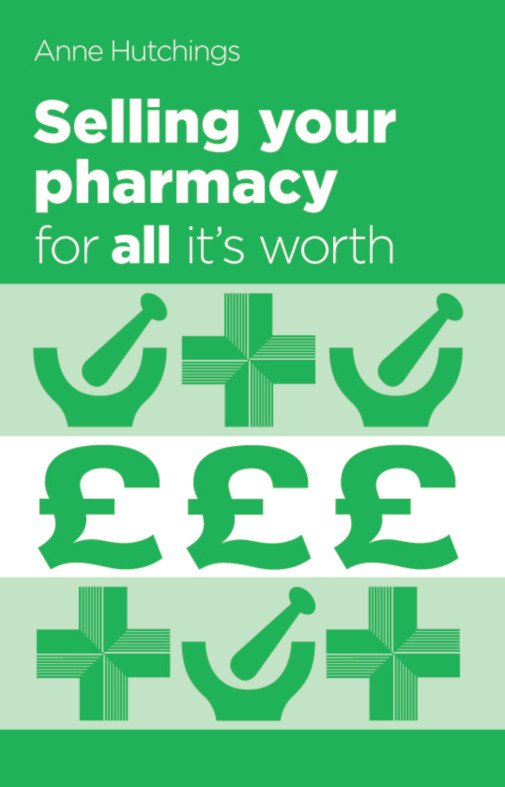Should you sell to a private buyer?
Record learning outcomes
 Selling a pharmacy can be a minefield but help is at hand in a new book from pharmacy sales expert Anne Hutchings. In the sixth of 12 extracts, Anne advises caution if you are approached by a private buyer...
Selling a pharmacy can be a minefield but help is at hand in a new book from pharmacy sales expert Anne Hutchings. In the sixth of 12 extracts, Anne advises caution if you are approached by a private buyer...
It can be flattering when someone tells you what a wonderful business you have, and asks if you want to sell it. If you know the individual, you may feel an element of trust. That is understandable – but if you are serious about selling, then hand the sale over to a professional.
The best way of dealing with a private sale is to appoint an agent and include the private buyer in the loop with other potential buyers. This way you can be confident that you are obtaining a proper market value for your pharmacy. In 90 per cent of cases when I include a vendor’s private buyer on my circulation list, I end up selling to a third party at significantly more than the private buyer offered.
Perhaps I only hear about the ones that go wrong, but it seems that an awful lot of private sales go belly up. If you are selling your business it is unlikely that you have previous experience to guide you. You don’t really want to be making mistakes with what is likely to be the most valuable asset you have.
Underselling the business
The only way you can be sure of obtaining the best price for your pharmacy is by getting competitive offers from different buyers. If you are only talking to a single private buyer, they have the upper hand in terms of negotiating the price and terms and conditions of the sale.
Breach of confidentiality
For many pharmacy owners maintaining confidentiality is one of the biggest worries during the sale of their business. If you are dealing with the sale yourself, you may find it difficult to maintain confidentiality. The process is time-consuming and it won’t be long before your staff guess what is going on.
Buyers who can’t fund the purchase
Many sales fall through because the buyer cannot raise sufficient funds. People often have little idea of the true cost of buying a business, particularly inexperienced first-time buyers who have not been through the process before. The reality is that many will fall down on the financing and be unable to complete.
You are unlikely to find this out until you are a few months down the line. A good pharmacy agent should know whether a buyer will be able to finance the purchase of your pharmacy.
Time wasters
If you are dealing with pharmacy sales day in, day out, you soon get to recognise the time wasters. There is the ‘paper trader’ who goes through the motions but never actually commits any money. Then there is the ‘dipper’, who is fishing for information about your business. And then there are some of the large players who appear to change the way they operate when negotiating a private deal.
Suddenly, shortly before completion, they may decide to reduce the price, try to re-negotiate previously agreed terms, or may pull out completely on some flimsy pretext. These buyers try to take advantage of the private sale situation which they have engineered, knowing that the seller has nobody else in the pipeline. Such buyers behave differently if the seller has gone through an agent because they know there will be other buyers lined up.
Poor terms of sale
When selling a pharmacy many issues have to be agreed with the buyer, not least the structure of the sale. Without proper advice a seller may be pressured into a structure that suits the
buyer, and this may result in the seller paying thousands more in tax than they need to. Other considerations Other points that arise during a sale include:
Stock
The buyer may not want to purchase all the stock. Do you know what the normal stock level is for your pharmacy and how to negotiate on this?
Retentions
Buyers often propose they retain part of the sale proceeds for a period of time as contingency. Do you know what is acceptable and how to negotiate this?
Re-negotiation during the sale
There can be many reasons why a buyer may try to renegotiate after a sale has been agreed. These might include, for instance, the loss of business from a care home, or a drop in prescription items, to name but a couple. Would you be able to assess these situations and know if there was a sufficient loss of value in the business to warrant a price reduction?
Some pharmacists see handling a sale themselves as a new challenge. The risk is that in focusing on the sale, you will not be looking after your business properly. If your focus switches away from your pharmacy, then the business is likely to deteriorate, and reduced turnover and profits means reduced goodwill value.
Â
 Anne Hutchings has been dealing with community pharmacists for over 20 years and has built up her company, Hutchings Consultants, to be the UK’s largest independent pharmacy sales agency. ‘Selling your pharmacy for all it’s worth’ (£12) can be ordered from Amazon (ISBN 9781 7846 22411) or from Hutchings Consultants. For a free copy (while stocks last) complete the form online at hutchings-pharmacysales. com or send a cheque for £12 (payable to Hutchings Consultants) to Hutchings Consultants Ltd, Maple House, 53-55 Woodside Road, Amersham, Bucks HP6 6AA
Anne Hutchings has been dealing with community pharmacists for over 20 years and has built up her company, Hutchings Consultants, to be the UK’s largest independent pharmacy sales agency. ‘Selling your pharmacy for all it’s worth’ (£12) can be ordered from Amazon (ISBN 9781 7846 22411) or from Hutchings Consultants. For a free copy (while stocks last) complete the form online at hutchings-pharmacysales. com or send a cheque for £12 (payable to Hutchings Consultants) to Hutchings Consultants Ltd, Maple House, 53-55 Woodside Road, Amersham, Bucks HP6 6AA